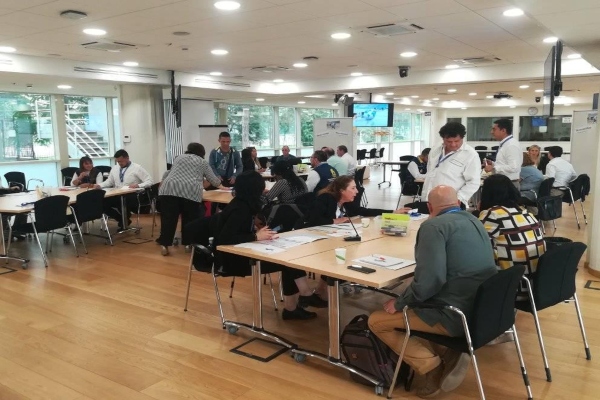
From 10th -14th June, the ILO and ITC Turin hosted a training workshop on ‘Disaster Risk Reduction and Sustainable Local Development through South-South and triangular cooperation’ in Spanish and Portuguese.
Disaster Risk Reduction is a precondition for sustainable development and decent work. This course aimed to empower policymakers and practitioners to build resilience to prevent and prepare for fragility situations caused by disasters supporting sustainable development and decent work at the local level. The training program directly contributed to ILO Outcome 4: Promoting sustainable enterprises, as well as to the Flagship Programme on Jobs for Peace and Resilience. It also facilitated dialogue and sharing of experiences amongst the participants.
The session on South-South and triangular cooperation (SSTC), presented by PARDEV-ESPU, firstly provided audiences the practical definition of SSTC, its main principles, the process that should be followed to implement projects in a SSTC framework, the actors involved, as well as the existing SSTC modalities & mechanism (e.g. South-South cooperation, triangular cooperation, the cooperation between regions, city-to-city cooperation, and fragile-to-fragile cooperation, etc.) and various formats of SSTC (e.g. capacity building, exchanges of experiences and good practices, creating and strengthening of networks and platforms, and establishing of partnerships and alliances, etc.) according to international framework on SSTC, notable from the outcome document of the Second High-level International Framework on South-South Cooperation (BAPA+40)

After facilitating the understanding of the audience on SSTC, the presentation then showcased SSTC’s importance in the context of Disaster Risk Reduction, Fragility, and Sustainable Development with some examples. The presentation then reported on the recent achievements in fragile-to-fragile cooperation, especially the role of g7+ in providing a platform for countries in fragile situations to discuss their lesson learned and experience in disaster risk reduction and sustainable development.

The session was followed by a presentation made by Fernando Baptista on the SSTC virtue platform www.southsouthpoint.net and group work (World Café) where participants exposed good practices in South-South and triangular cooperation to cope with the disaster risk reduction and fragility issues focusing on current and future partnerships. In the group work, four good practices were chosen to be presented and received recommendations from participants:
- Country-to-Country: Reducción y Gestión del riesgo de desastres para apoyar a las comunidades agropecuarias afectadas por sequías recurrentes y otros desastres naturales en el sur de Angola y norte de Namibia by Lisa Angeli
- City-to-City: Cooperación triangular urbana: Construyendo desarrollo resiliente al clima en la Cuenca del Paraná by Mauricio Saldivar
- Triangular Cooperation: Proyecto SAVER-Net Sistema de Gestión de Riesgos Medioambientales Atmosféricos en Sudamérica by Maria Mele
- Sub-regional Cooperation: Estrategia andina de gestión del riesgo de desastres 2017 – 2030. Planificación y ordenamiento territorial by Diego Armando Rivera Gutierrez
The 30-course participants represented a variety of Latin American countries with very diverse professional backgrounds (representatives from governments, NGOs, universities, private sector) working on disaster risk reduction and sustainable development in their respective countries. During an “experiences fair”, all participants were requested to present their projects on disaster risk reduction identifying already existing or potential components for south-south collaboration, as well as highlighting good practices.
The course was well received and participants indicated their interest on the impact of SSTC in the context of disaster risk reduction and sustainable development, as well as in continuing interacting and exchanging/building knowledge within the framework of SSTC
Please find more information in Portuguese and Spanish.
Follow the discussion on the course on the thematic space and SS Meeting Point Facebook Page

